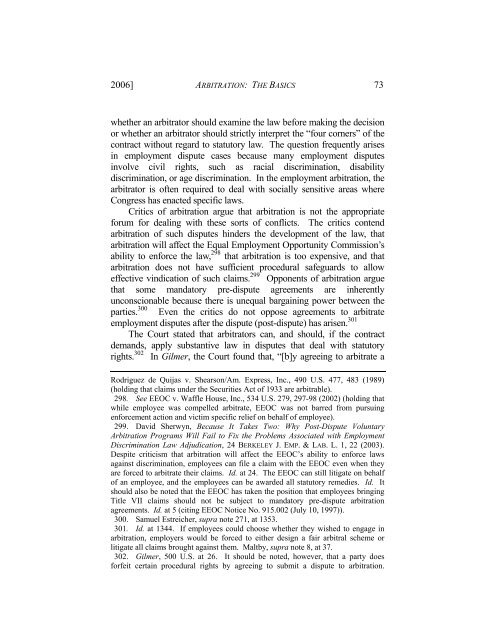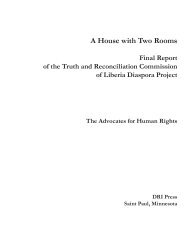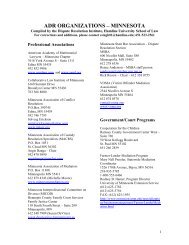2006/Vol. 5 No.1 - Hamline Law - Hamline University
2006/Vol. 5 No.1 - Hamline Law - Hamline University
2006/Vol. 5 No.1 - Hamline Law - Hamline University
You also want an ePaper? Increase the reach of your titles
YUMPU automatically turns print PDFs into web optimized ePapers that Google loves.
<strong>2006</strong>] ARBITRATION: THE BASICS 73<br />
whether an arbitrator should examine the law before making the decision<br />
or whether an arbitrator should strictly interpret the “four corners” of the<br />
contract without regard to statutory law. The question frequently arises<br />
in employment dispute cases because many employment disputes<br />
involve civil rights, such as racial discrimination, disability<br />
discrimination, or age discrimination. In the employment arbitration, the<br />
arbitrator is often required to deal with socially sensitive areas where<br />
Congress has enacted specific laws.<br />
Critics of arbitration argue that arbitration is not the appropriate<br />
forum for dealing with these sorts of conflicts. The critics contend<br />
arbitration of such disputes hinders the development of the law, that<br />
arbitration will affect the Equal Employment Opportunity Commission’s<br />
ability to enforce the law, 298 that arbitration is too expensive, and that<br />
arbitration does not have sufficient procedural safeguards to allow<br />
effective vindication of such claims. 299 Opponents of arbitration argue<br />
that some mandatory pre-dispute agreements are inherently<br />
unconscionable because there is unequal bargaining power between the<br />
parties. 300 Even the critics do not oppose agreements to arbitrate<br />
employment disputes after the dispute (post-dispute) has arisen. 301<br />
The Court stated that arbitrators can, and should, if the contract<br />
demands, apply substantive law in disputes that deal with statutory<br />
rights. 302 In Gilmer, the Court found that, “[b]y agreeing to arbitrate a<br />
Rodriguez de Quijas v. Shearson/Am. Express, Inc., 490 U.S. 477, 483 (1989)<br />
(holding that claims under the Securities Act of 1933 are arbitrable).<br />
298. See EEOC v. Waffle House, Inc., 534 U.S. 279, 297-98 (2002) (holding that<br />
while employee was compelled arbitrate, EEOC was not barred from pursuing<br />
enforcement action and victim specific relief on behalf of employee).<br />
299. David Sherwyn, Because It Takes Two: Why Post-Dispute <strong>Vol</strong>untary<br />
Arbitration Programs Will Fail to Fix the Problems Associated with Employment<br />
Discrimination <strong>Law</strong> Adjudication, 24 BERKELEY J. EMP. & LAB. L. 1, 22 (2003).<br />
Despite criticism that arbitration will affect the EEOC’s ability to enforce laws<br />
against discrimination, employees can file a claim with the EEOC even when they<br />
are forced to arbitrate their claims. Id. at 24. The EEOC can still litigate on behalf<br />
of an employee, and the employees can be awarded all statutory remedies. Id. It<br />
should also be noted that the EEOC has taken the position that employees bringing<br />
Title VII claims should not be subject to mandatory pre-dispute arbitration<br />
agreements. Id. at 5 (citing EEOC Notice No. 915.002 (July 10, 1997)).<br />
300. Samuel Estreicher, supra note 271, at 1353.<br />
301. Id. at 1344. If employees could choose whether they wished to engage in<br />
arbitration, employers would be forced to either design a fair arbitral scheme or<br />
litigate all claims brought against them. Maltby, supra note 8, at 37.<br />
302. Gilmer, 500 U.S. at 26. It should be noted, however, that a party does<br />
forfeit certain procedural rights by agreeing to submit a dispute to arbitration.
















